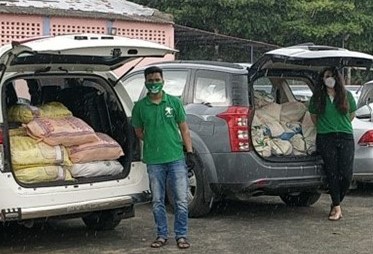Context:
India, with a population of 1.4 billion, accounts for one quarter of the world’s undernourished and over 190 million hungry people. In the 2023 Global Hunger Index, India is ranked 111th out of 125 countries, with a level of hunger categorized as “serious”. In India, the second largest food producer in the world based on calorie content, approximately 68 million tonnes of food goes to waste each year. It is estimated that an astounding 40 per cent of food gets wasted during big occasions like weddings. While the progress over the decades has been steady, malnutrition remains a major challenge for the country.
Implementation of programme/initiative:
The Robin Hood Army (RHA), founded in 2014, is a volunteer-driven initiative to address hunger by redistributing surplus food from restaurants and communities to those in need. Operating on a zero-funds model, the RHA local chapters (communities or cities), led by friends and colleagues, operate in a decentralized manner, with each chapter focusing on its own community. Volunteers, predominantly students and young professionals, dedicate their free time to this noble cause.
RHA targets a diverse range of vulnerable groups, including homeless families, orphanages, patients in public hospitals and residents of care homes for older persons. By leveraging the goodwill of local restaurants and the dedication of volunteers, RHA ensures that surplus food does not go to waste, but instead serves those who are hungry. This feeder programme not only provides food, yet also education, empowering street children with the tools they need to build a better future. The RHA commitment to combating hunger and nurturing communities actively addresses six SDGs: Zero Hunger (SDG 2), Good Health and Well-being (SDG 3), Quality Education (SDG 4), Reduced Inequalities (SDG 10), Sustainable Cities and Communities (SDG 11) and Responsible Consumption and Production (SDG 12).
Main challenges:
The main problem that RHA tries to address is the lack of consistent availability of food to everyone in need, and ensuring its distribution to those who require it. RHA aims to bridge this gap and provide meals to less fortunate citizens. One significant hurdle for RHA has been the recruitment of volunteers who can commit the entire required time without compensation. This constraint has stemmed from the RHA fundamental rule of operating without any financial resources, adhering strictly to their golden rule of “zero funds”. To overcome this, RHA has leveraged its sense of purpose and motivation, emphasizing the intrinsic value of its cause, and the volunteers have been driven by a genuine desire to do good rather than monetary gain. RHA has also mobilized support from media houses, corporates and artists to aid in their mission, thereby expanding their reach and impact. Despite the difficulties of managing rapid growth and maintaining motivation, RHA has reinforced its sense of purpose, continually reminding volunteers of the reason they joined the organization. This approach has helped sustain their momentum and commitment to the cause, overcoming the challenges associated with their unique operational model.
Results achieved:
RHA has made significant strides in addressing hunger and education. With the help of over 250,000 volunteers or “robins”, RHA has already served over 28,000,000 people across 159 cities, with plans to expand to more cities and countries. Its “1% Done” philosophy emphasizes the need for disruptive growth to tackle hunger effectively. In the domain of education, the Robin Hood Academy has empowered over 7,328 street children with basic primary education, acting as a bridge between the streets and schools. Regular weekend classes and excursions are conducted to foster a spirit of learning among these children. Beyond food and education, RHA also organizes health check-ups, blood donation drives and plantation drives to engage local communities. Its campaigns have been supported by major corporations like Google, Uber and WhatsApp, which have, among them, provided infrastructure, rides, a dedicated chatbot and millions of meals.
Moving forward:
Moving forward, RHA aims to expand its reach into smaller towns across India, ensuring that its services extend to areas beyond major cities. The organization also intends to broaden its presence in Africa and Latin America, indicating a global expansion strategy to address hunger and educational disparities in these regions. Furthermore, it plans to scale up the Robin Hood Academy, focusing on enrolling children living on the streets in public schools, thereby providing them with access to education and opportunities for a better future.
Replicability:
The replicability of the RHA model in other cities and countries is evident from its successful expansion across 13 countries, namely: Bahrain, Bangladesh, Botswana, India, Indonesia, Guinea Malaysia, Nepal, Nigeria, Pakistan, Sri Lanka, Uganda and Zambia. By serving over 141 million people across 406 cities, RHA has demonstrated the adaptability and effectiveness of its approach in diverse sociocultural contexts. The organization’s emphasis on grassroots mobilization, volunteer-driven operations and strategic partnerships makes its model scalable and replicable globally. Overall, the RHA zero-funds model, also studied by the Harvard Business School, indicates the potential to be replicated and adapted to address food insecurity and educational challenges in various cities and countries worldwide.
References:
- https://robinhoodarmy.com
- https://robinhoodarmy.com/academy
- https://hbr.org/podcast/2019/11/can-the-robin-hood-army-grow-with-zero-financial-resources
This good practice was kindly prepared by Ms. Aditi Bhagwat Prasad
Project Details
Date: May 3, 2024
